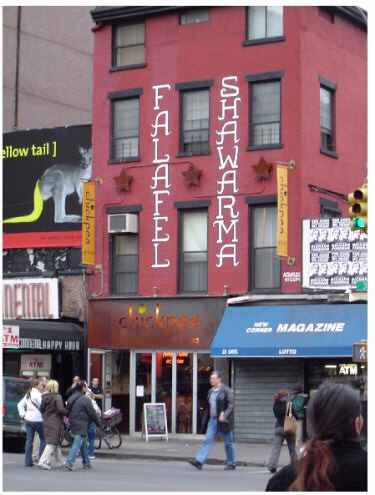 I sat with my uncle outside Boudin Bakery on Ofarrell drinking cappuccino and sharing a scone. It was a glorious Saturday afternoon in downtown San Francisco; warm but not humid, sunny but not glaring. The sky was the idyllic blue that’s never seen in New York or Los Angeles, and the entire city, tourists and locals, was enjoying the shops around Union Square.
I sat with my uncle outside Boudin Bakery on Ofarrell drinking cappuccino and sharing a scone. It was a glorious Saturday afternoon in downtown San Francisco; warm but not humid, sunny but not glaring. The sky was the idyllic blue that’s never seen in New York or Los Angeles, and the entire city, tourists and locals, was enjoying the shops around Union Square.
My uncle was in town for a medical conference at Stanford. He is a gastrointestinal surgeon at Hadassah Hospital in Jerusalem, and was staying at my parents’ house in Palo Alto. He comes frequently to the States for such conferences, usually every four months, and we’ve shared the same routine of getting lunch and having a coffee every time. He has a penchant for any type of food that is not typically prevalent in Israel: Thai, Vietnamese, Mexican. Today was dim sum. We were discussing my upcoming move back to Israel in the fall for graduate studies.
“Why Israel?” he asked, “You can study economics anywhere.”
“I know,” I replied, “but I’ve been wanting to live in Israel as an adult for years, and I’ve been wanting to go back to graduate school for years, so why not do both at the same time?”
“You’re parents must be worried.”
“I’m sure they are, especially my mother. I think she’s kind of anti-Israel.”
“She’s not anti, she just remembers the Israel of her childhood, and she’s watched from the sidelines as the country has stagnated over the past 30 years.”
“Is that why every time we go back to visit for summer vacations she complains and tells me how hard it is to live there?”
“Look, Israel is not America. America is easy. You want internet in your apartment, you make a call, you want to buy new furniture, you get in your car and go to Ikea.”
”I know Israel is not America.”
“I know you do, but the vast majority of American Jews, including the children of Israelis, have no idea what the day to day is like. They come to Israel for Birthright or summer trips with their family and get pampered.”
A week earlier, I had been invited to my mother’s monthly book club meeting for the first time. The topic was the newest novel from Eshkol Nevo, a young author who was gaining a lot of notoriety in Israel. I devoured the novel in a week in order to convince my mother to let me attend, as she is very protective of her book club. I had always wanted to join in one of the meetings, partially out of curiosity and partially because I felt some deeper need to reconnect with current Israeli culture
The house was packed: 40 chairs set in two concentric circles in the living room, with so many desserts on the coffee table that there was no room for anything else. The guests were all familiar to me from my parents’ social circle in the South Bay. They were the typical Israeli baby boomers working in the high tech industry; the mid-fifties to early-sixties set, well established, with kids in their late teens to mid twenties, living the pre-retirement years on comfortable salaries, well-diversified 401Ks and mesh chairs with lumbar support.
The book club was just one outlet in a long string of overlapping social events shared by the Israeli community of the area. They check out the same books from the Hebrew library at the Cubberly Community Center, they go to lectures together thrown by the Consulate, they hike the hills behind Stanford together, and they all get pita from the same Lebanese grocer in Mountain View. They are as distinct from the larger Jewish community as they are from the other ethnic groups in the region. While the American Jewish population of the Bay Area is connected through various temples, youth groups, or one of the few large summer camps, the Israelis immigrants of my parents’ generation are characteristically isolationists. They seem to mix at the office or in Pilates class, but the second they get home they remove the mask and cease association with other ethnicities, even with other American Jews.
“Look at your little sister, for example,” continued my uncle, “She comes to visit for two weeks every summer and has a great time and we love to see her, but do you really think she could up and move to Tel Aviv and find a job and an apartment? She barely speaks Hebrew. She doesn’t read or write the language. All the Hebrew she heard growing up was `Did you do your homework? ` and `When are you coming home?’”
“Most of my friends who are children of Israelis are like that” I replied.
“Exactly. The truth is that they are secular American Jews, not Israelis. And you know as well as I do that American Jews and Israelis are completely different things”.
I thought how angry my “secular American Jewish” friends would be to hear this, to have an Israeli refer to them as American. It also struck me as odd to refer to them as American Jews, as even my most Americanized Israeli friends were still somewhat distinct. Regardless of religious denomination, American Jews all seemed to be connected through latent Eastern European Ashkenazi idiosyncrasies. One could be a Reconstructionist and the other could be Conservadox, yet they both would laugh at how much Larry David reminds them of their father. The Israelis, on the other hand, feel little kinship toward these quirks. Many also referred to themselves as “Israeli Americans”, which always struck me as a little odd. It seemed like a trite manifestation of the general need of the Y-generation to create a sense of uniqueness and individuality, and less from a genuine sense of rootedness and connection to Israel. 
“Then how do you explain my situation?” I said, in defense of my friends, “And the fact that I’m going back after nearly 20 years in the States?”
“You are the anomaly,” my uncle responded, “I have no idea why you are so mixed, but you have to admit that you’re weird fascination with Israel is not normal among your generation.”
“How do you figure?”
“C’mon… how many other kids do you know voluntarily attend their mother’s book club?”
====
That morning I’d been on the phone with my good friend Edan. He had just finished his BA in electrical engineering from SF State and tonight was his graduation party. During the day, he was in school, and at night, he taught Hebrew class at Temple Emanuel to the pubescent kids of the upper middle class Jewish population of the city. He was part of my Israeli friends, who did not mix with my American friends. My attempts to combine the two groups had been disappointing. Beyond the typical niceties and innocent flirtations, it was clear that no substantive associations had emerged across the groups. Edan, like my parents, related to the non-Israeli Jewish community of San Francisco only in situations where he had to, like in lectures or study groups. Every other moment was strictly Israeli. Most other teachers at Emanuel were similar: all recent immigrants to the States, all pursuing their own version of a “finding yourself” quarter-life crisis. They went out together, played pickup soccer together, and went thrift-store shopping on the Haight together. In this sense, these Y-generation Israeli immigrants shared the same characteristics as my parents’ generation of Israeli immigrants, namely a perceptible separation from the larger Jewish community, as well as a marked affiliation with all things Israeli. 
“I understand why your mother seems to be opposed to you moving back,” my uncle took his last sip of cappuccino and reached in to his jacket pocket for his cigarettes, “You are basically subverting all the reasons she left Israel to begin with.”
“What do you mean?” I asked.
“Your parents left for very simple reasons,” my uncle lit a cigarette, “First, whatever future they wanted for themselves simply didn’t exist in Israel, and second so their children would have the opportunity to live easier and more normal lives. Now you are planning to do the exact opposite. You are moving away from the land of opportunity and putting yourself back in the mess they tried to avoid.”
“But it has nothing to do with my parents,” I protested, “It’s my choice to go back”
“And that is what is the most frustrating to your mother. You are an adult and you make your own decisions. It would be much easier for her if you were ten years old and she could just tell you no, you are staying here with mommy and daddy.”
I realized then that Edan and the rest of my Israeli friends immigrated for the same reasons as my parents and their friends. Israel still suffers from the same insecurity, instability, and political turmoil as it did thirty years ago when my parents got married and first started thinking of leaving. And the reality was that my uncle was largely right: I and most of my friends were children of the baby boomers, and probably did have a diluted understanding of the day-to-day complications of life in Israel. To us, Israel meant doting grandparents, weddings for second cousins, days on the beach, and falafel. To recent immigrants, regardless of the generation, Israel signified familiarity, but also the difficult tradeoff of leaving behind all that was known in the hopes of a future of calm and normalcy.
Still, like most first-generation immigrant groups, Edan and my Israeli friends continued to cling to the familiar, surrounding themselves with other Israelis who share the same mentality, history, and upbringing. Meanwhile the second generation, people like me, have benefited from the easier lifestyle afforded to well-off Americans, and are rooted and connected to that lifestyle. There are thus distinct differences between second-generation Israeli Americans on the one hand, and on the other, first-generation immigrants and family or friends who remain in Israel. The differences are in the smaller nuances of life, like the use of language, social norms, or fashion. But these minor idiosyncrasies do create a binary nature in Israelis living in America, where new immigrants are distinctly Israeli, and their children are distinctly Americanized.
“Listen,” my uncle took the last drag of his cigarette, “I understand that you feel like you have an Israeli identity. Everybody wants an identity.”
“Not exactly”, I interjected, “I feel like an Israeli when I’m here, and I feel like an American when I’m there.”
“But that is how it is always going to be. You grew up in America, but your Israeli passport is with you for life. It’s like herpes; you can never get rid of it. Just some people have worse symptoms than others, and some have worse flare ups than others”.
“And now I’m going back, which is only going to make it more confusing,” I was thinking out loud.
“You have to think about it positively. Clearly you have to get this out of your system, and hopefully you will get a better understanding of where you belong. And even if you don’t you will probably meet some Israeli girl who used to be a tank commander and she will decide for you.”
“My mother would be thrilled”, I laughed, “I just have to figure out where to find her”
“That’s a whole other conversation”, my uncle winked.








lovastatin will increase the level or effect of maraviroc by P glycoprotein MDR1 efflux transporter lasix 80 mg Cancer Prevention Overview PDQ Health Professional Version
doxycycline staph infection Monitor Closely 2 fosphenytoin will decrease the level or effect of cyclosporine by affecting hepatic intestinal enzyme CYP3A4 metabolism.
clomid donde puedo comprar Rooney KL, Domar AD.
using wooden wall decors at home is a great alternative to using those expensive metal wall decors;
Wow, wonderful blog layout! How lengthy have you ever been running a blog for? you make running a blog glance easy. The total look of your web site is magnificent, well the content material!
drug addiction is a menace to the society, it destroys lives and it destroys the community::
Outstanding post, you have pointed out some excellent points , I likewise think this s a very good website.